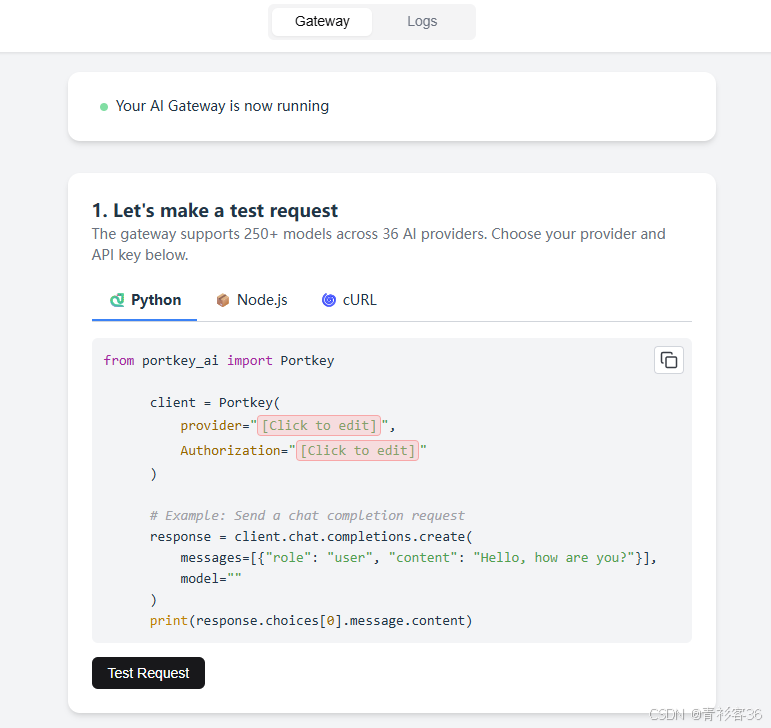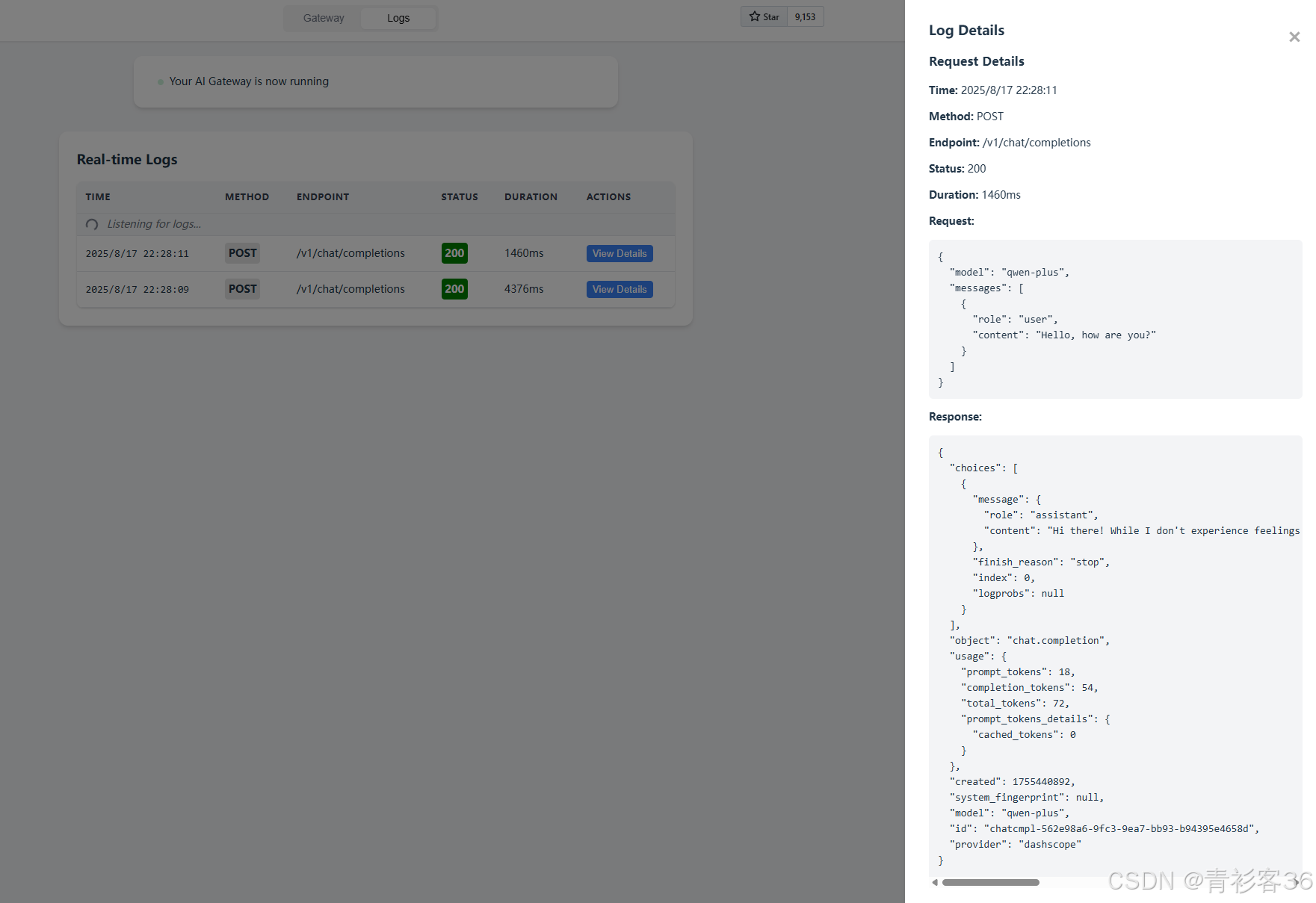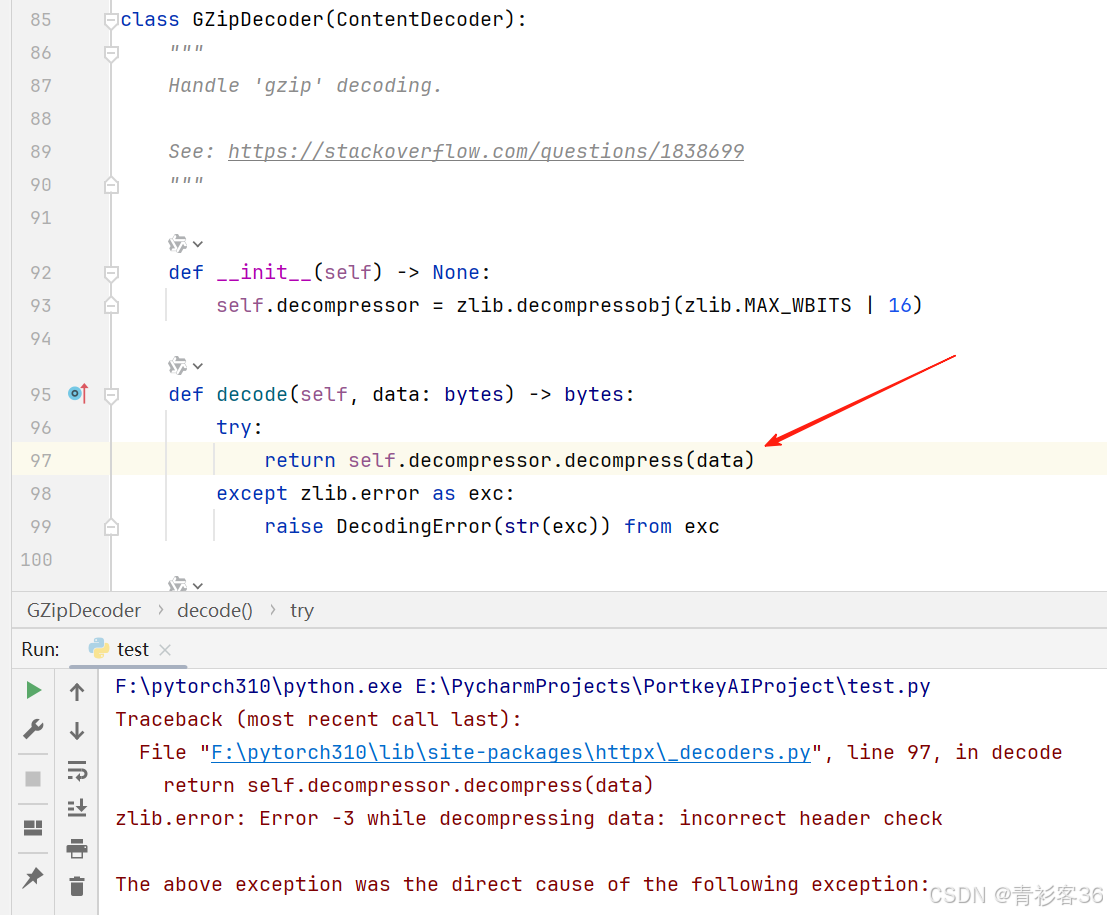笔者最近在本地搭建了Portkey AI Gateway(模型路由网关),然后按照文档中的方式进行测试。

结果发现,网关能够接收到请求,但是Python测试的程序却运行报错。

Python代码报错信息如下:
bash
Traceback (most recent call last):
File "F:\pytorch310\lib\site-packages\httpx\_decoders.py", line 97, in decode
return self.decompressor.decompress(data)
zlib.error: Error -3 while decompressing data: incorrect header check
The above exception was the direct cause of the following exception:
Traceback (most recent call last):
File "F:\pytorch310\lib\site-packages\portkey_ai\_vendor\openai\_base_client.py", line 989, in request
response = self._client.send(
File "F:\pytorch310\lib\site-packages\httpx\_client.py", line 928, in send
raise exc
File "F:\pytorch310\lib\site-packages\httpx\_client.py", line 922, in send
response.read()
File "F:\pytorch310\lib\site-packages\httpx\_models.py", line 881, in read
self._content = b"".join(self.iter_bytes())
File "F:\pytorch310\lib\site-packages\httpx\_models.py", line 898, in iter_bytes
decoded = decoder.decode(raw_bytes)
File "F:\pytorch310\lib\site-packages\httpx\_decoders.py", line 99, in decode
raise DecodingError(str(exc)) from exc
httpx.DecodingError: Error -3 while decompressing data: incorrect header check
The above exception was the direct cause of the following exception:
Traceback (most recent call last):
File "E:\PycharmProjects\PortkeyAIProject\test.py", line 10, in <module>
response = client.chat.completions.create(
File "F:\pytorch310\lib\site-packages\portkey_ai\api_resources\apis\chat_complete.py", line 183, in create
return self.normal_create(
File "F:\pytorch310\lib\site-packages\portkey_ai\api_resources\apis\chat_complete.py", line 126, in normal_create
response = self.openai_client.with_raw_response.chat.completions.create(
File "F:\pytorch310\lib\site-packages\portkey_ai\_vendor\openai\_legacy_response.py", line 364, in wrapped
return cast(LegacyAPIResponse[R], func(*args, **kwargs))
File "F:\pytorch310\lib\site-packages\portkey_ai\_vendor\openai\_utils\_utils.py", line 287, in wrapper
return func(*args, **kwargs)
File "F:\pytorch310\lib\site-packages\portkey_ai\_vendor\openai\resources\chat\completions\completions.py", line 925, in create
return self._post(
File "F:\pytorch310\lib\site-packages\portkey_ai\_vendor\openai\_base_client.py", line 1259, in post
return cast(ResponseT, self.request(cast_to, opts, stream=stream, stream_cls=stream_cls))
File "F:\pytorch310\lib\site-packages\portkey_ai\_vendor\openai\_base_client.py", line 1021, in request
raise APIConnectionError(request=request) from err
openai.APIConnectionError: Connection error.然后笔者定位到报错位置,发现是gzip解码时出现了问题。

症状是 incorrect header check,最终定位到网关在响应里带了 Content-Encoding: gzip 头,但实体其实是明文 JSON(即"假压缩头")。任何会自动解压的客户端(httpx/Portkey SDK 等)都会在读取阶段失败。
要想在根源上修复这个问题,需要在网关/反代上保证"头与实体一致"------不压就删 Content-Encoding;压了就只压一层并设置正确的头。可是这个网关是直接运行起来的开源项目,所以笔者只好想了一个临时的办法来解决这个问题:客户端用 httpx.stream(...).iter_raw() 读原始字节并手动解析。
复现与第一轮尝试
1) 最初用 Portkey SDK 直连 provider
python
from portkey_ai import Portkey
client = Portkey(provider="dashscope", Authorization="Bearer <key>")
client.chat.completions.create(model="qwen-plus", messages=[...])现象 :httpx.DecodingError。
直觉:解压阶段挂了 → 看压缩相关头部。
2) 改走本地网关 base_url
python
Portkey(base_url="http://localhost:8787/v1")这时 Portkey 的 provider= 参数不会自动变成网关能识别的路由头,于是网关返回:
400 {'status': 'failure', 'message': 'Either x-portkey-config or x-portkey-provider header is required'}结论 :走自托管网关必须用请求头指明路由(x-portkey-provider)。
我们补上头之后,仍旧 遇到 DecodingError。说明不仅是路由问题,压缩/头部也有坑。
关键破局:跳过自动解压,直看"线上的原始字节"
为排除客户端自动行为干扰,直接用 httpx.stream(...).iter_raw():
python
import httpx, json
GATEWAY = "http://localhost:8787/v1"
payload = {"model": "qwen-plus", "messages": [{"role": "user", "content": "Hello"}]}
headers = {
"x-portkey-provider": "dashscope",
"Authorization": "Bearer <your_secret_key>",
"Accept-Encoding": "identity",
"Content-Type": "application/json",
}
with httpx.stream("POST", f"{GATEWAY}/chat/completions", json=payload, headers=headers, timeout=30) as r:
print("status =", r.status_code)
print("Content-Encoding =", r.headers.get("content-encoding"))
raw = b"".join(r.iter_raw()) # ★ 不做解压,拿"线上的原始字节"
print("raw len =", len(raw))
print("raw head =", raw[:80])
# 如果服务端其实是明文 JSON(却错误地带了 Content-Encoding)
try:
print("as text ->", raw[:200].decode("utf-8"))
except Exception: # 如果真的是 gzip,可自行解压看
import gzip, io
try:
txt = gzip.GzipFile(fileobj=io.BytesIO(raw)).read().decode("utf-8")
print("as gzip json ->", txt[:200])
except Exception as e:
print("manual decode failed:", e)实际输出(核心证据):
status = 200
Content-Encoding = gzip
raw len = 448
raw head = b'{"choices":[{"message":{"role":"assistant","content":"Hi there! \xd9\xa9(\xe2\x97\x95\xe2\x80\xbf\xe2\x97\x95\xef\xbd\xa1)'
as text -> {"choices":[{"message":{"role":"assistant","content":"Hi there! ٩(◕‿◕。)۶ How can I assist you today?"},"finish_reason":"stop","index":0,"logprobs":null}],"object":"chat.completion","usage":{结论 :服务端响应头声称 gzip,但实体实际上是明文 JSON 。
这就是"假压缩头"。httpx/SDK 看到 Content-Encoding: gzip 会尝试解压,结果自然报 incorrect header check。
为何会出现"假压缩头"?
常见几种错误链路:
- 上游原本 gzip,但中间层解压了实体,却忘了删
Content-Encoding头; - 上游明文 ,但中间层"不小心"加了
Content-Encoding: gzip; - 双重压缩:上游已 gzip,网关又对同一实体再压一层(头与实体层级不一致)。
这类错误必须在服务端/网关侧修。只靠客户端改代码是治标不治本。
Checklist:以后再遇到类似"解压报错",按这个查
- 对齐两个关键头 :
Accept-Encoding(请求) vsContent-Encoding(响应) - 抓原始字节 :
iter_raw()→ 看是否"明文 + gzip 头" - 断开自动解压的假象:客户端临时改为手动解析
- 修服务器:不压就删头;压就只压一层、头与体一致
- Portkey 自托管 :走
base_url必带x-portkey-*路由头;鉴权不要留空
到这里,问题的根因就找到了,并且我们也提出了临时的解决方案。下一步就是深入源码来看看这到底是怎么个事儿!
读者朋友们感兴趣的话,也可以阅读下这个项目的源码(https://github.com/Portkey-AI/gateway),看看它到底是怎么实现的hh\~。